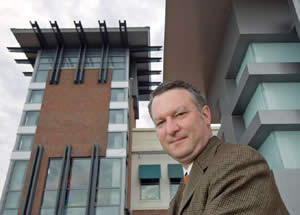SHARE:
Cover Story - Growth Planning
Who's Lesley Blackner?
Meet the woman whose ideas are hated by every business group in Florida.
|
Born in Japan, Blackner came to Florida at age 5 when her naval aviator father was transferred here. Her mother was a mild-mannered Southerner, and Blackner bemoans not having an assertive role model, once saying on a law panel that "I didn't start to think for myself until I was 35." A University of Florida law grad, she worked for a state appellate judge for five years in Daytona Beach, where she despaired of finding a husband -- "it's all bikers" -- and trembled at the thought of being an unmarried law clerk at 40.
She returned to Jacksonville, but met her future husband, Richard Stone, also a lawyer, at a chance meeting in a Philadelphia restaurant. They have two sons, Clayton, 10, and Bennett, 3, and live in Palm Beach, a block from the ocean, in a 1924 home valued at $1.5 million -- a modest valuation by the standards of one of the wealthiest municipalities in America. Asked whether her home on a barrier island would exist if the land-use controls she advocates had been in place when it was built, she says, "Maybe there comes a point where you say 'enough's enough.' "
In Palm Beach, she continued environmental and citizen activist pro bono work that she had begun in Daytona. She fought against the Suncoast Parkway in west-central Florida for the Sierra Club. She helped form a group, F.E.A.R., Floridians for Environmental Accountability & Reform, to protest Army Corps of Engineers permitting practices. She says she became increasingly frustrated at how elected leaders ignored residents' wishes, and she came to see Florida land-use regulation as a corrupt system.
Blackner credits two sources with forming her thinking on growth: An essay titled "Is No Growth Also Smart Growth?" by California planner Chris Williamson, and a book, "Better, Not Bigger," by Oregon planner Eben Fodor. Williamson, in an interview, argues that as long as the federal government has a "de facto policy" of population growth through immigration, "a community has a right to self-defense."
In his essay, Williamson writes: "If a community or region refuses to grow, the result may be higher prices, economic displacement and hardship, and dangerous crowded housing in exchange for keeping a desirable quality of life for the 'already landed' middle- and upper-income groups. If the local voters are willing to pay this price, why should planners try to prevent it?"
Fodor's book, meanwhile, argues against what he calls the myths of growth: That it provides needed tax revenue, that it must be stimulated to provide jobs, is inevitable and that communities must grow or die. Blackner echoes his themes, arriving for an interview carrying, in a Bloomingdale's bag, videotapes that expound or share her views. "Six Fairy Tales About Growth in Florida" is one title from F.E.A.R.
Inspired by California counties that require voter approval of major land-use changes, Blackner decided to go even further. She began contemplating a statewide amendment that would allow local voters to approve all comp plans and plan changes.
As her thoughts gelled, she teamed with Ross Burnaman, a Tallahassee lawyer who practices primarily environmental and land-use law. While with the Florida Fish and Wildlife Conservation Commission in 2001, he had been impressed with a presentation Blackner made at a law conference about her fight in Volusia County for sea turtles and against beach driving. "Ross gets at least as much credit. Without Ross, we wouldn't be where we are," Blackner says.
With Blackner's input, Burnaman wrote the amendment in 2003. They co-founded the Hometown Democracy committee. "The plans are not guiding the growth; the growth is guiding the plans," says Burnaman, 49.
The two suffered a setback when the Florida Supreme Court, which must approve the wording of amendments, rejected their initial ballot summary in 2005, invalidating 80,000 signatures they had gathered. The court gave them new life in June on a rewritten summary, overriding the objections of the Florida League of Cities, Florida Association of Counties and Florida School Boards Association.
























